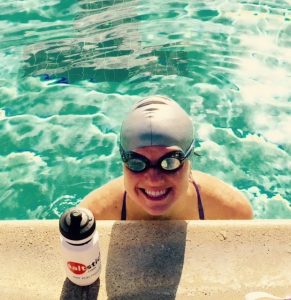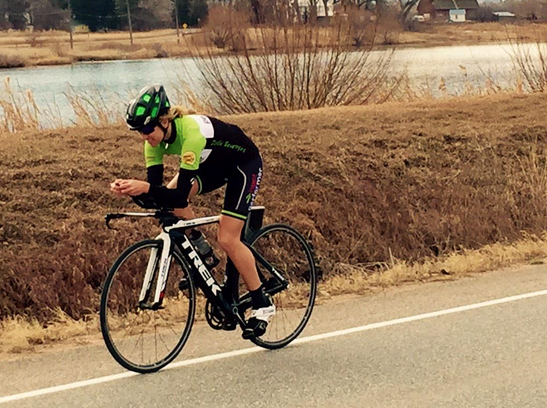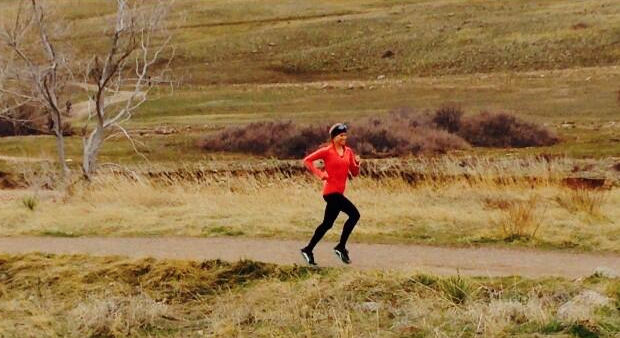
At the end of her junior year of college, Lauren Goss decided to use swimming as a way to ease the stress of studying. Just a few years – and a lot of hard work – later, Lauren is a professional triathlete, coached by triathlon legend Dave Scott, and preparing for a stellar year of racing in 2015.
For someone who grew up competitively swimming but was “never good enough” (her words, not ours), Lauren’s record is impressive, including 1st place wins at 5150 Mont Tremblant, 5150 New Orleans, Ironman 70.3 Syracuse, and a long list of other top finishes. She got her start in ITU racing, but soon switched to non-drafting races, which give athletes more control over the pacing and strategy. After putting in a few years of hard work and training, Lauren worked her way to become a very successful professional triathlete.
We chatted with Lauren about her goals, motivations and experiences as a pro. Lauren also provided some great advice to first-timers and those considering getting more involved in triathlon.
Getting started:
After returning to swimming during her junior year of college, Lauren started running with a few other students. The next year, her boyfriend completed a triathlon and convinced Lauren to buy a road bike and try a tri herself. A 5th-place finish at the collegiate national championships won the attention of the USAT, and Lauren’s career as a professional began.
After switching from ITU-style racing to non-draft racing, Lauren moved to Florida to train with other non-draft athletes, including swimming legend Sara McLarty.
“I was very poor for two years and was basically living off my savings from college,” Lauren said. “I kept setting small goals for myself and slowly worked my way up.”
Her perseverance paid off. After a consistent year of racing in 2013, Lauren earned several loyal sponsors, and 2014 included three first-place wins and 8 more top-five finishes.
Staying motivated:
Luckily, Lauren said she doesn’t really struggle with motivation throughout the year.
“I love racing, and I love training hard,” Lauren said. “I am pretty obsessive with numbers, so I like seeing my progress through swimming times in the pool, power wattage on the bike, and run paces.”
Lauren also has the advantage of living in Boulder, Colorado, a triathlete haven home to several huge names in the sport, including 2014 World Champion Mirinda Carfrae and husband Tim O’Donnell. Dave Scott, Lauren’s coach and six-time Ironman World Champion, also lives in Boulder and coaches many of these pros.
Being surrounded by other top athletes helps Lauren stay focused and continue to push herself to get the most out of her training.
“I admire the athletes who start the sport without any notable athletic strengths and really work their way up to becoming one of the best,” Lauren said. “I also admire the age groupers who work eight hours a day and still find time to train and compete in races. I personally know how tiring training is, so to work a day job and train is incredible and something that inspires me.”

Life as a professional:
While triathlon is renowned for its toughness, there are several upsides to being a professional, including the travel and food.
“I can eat almost anything I want,” Lauren said. “I tend to eat very clean and stay away from going out too much and eating processed foods. However, I eat a TON of food, and I don’t worry about weight gain because fortunately for me my job revolves around exercising.”
Triathlon has also been a venue through which Lauren has seen many new places. Her favorite races have been in Budapest; Portland, Maine; and Mont Tremblant, Quebec.
The hardest part, though, isn’t the racing or training. It’s the rest.
“As athletes (particularly triathletes), we all like to suffer so enduring the pain isn’t really the hard part,” Lauren said. “We all get caught up in what everyone else is doing and we constantly think we have to have our foot on the gas. I know personally I always think I need to do more. In reality, we all need to rest more.”
SaltStick:
After experiencing dizzy spells in early races, Lauren realized she was drinking too much water in lieu of electrolytes. This situation, known as hyponatremia, can lead to fatigue, muscle cramping and the feeling of “bonking.” You can read more about it in the “Salt Science” section of our website.
“I was drinking so much water and flushing my system of all electrolytes and this was causing me to have a bonking sensation,” Lauren said. “Since I have started using SaltStick, I have maintained a healthy balance of electrolytes and water and finish my races strong now.”
Make sure you don’t bonk! We provide a guide to using SaltStick on our website, and we encourage you to check it out so you can tailor a nutritional plan to your specific needs. For an overview of the electrolytes SaltStick provides, check out our blog post “Why You Need Salt and Where to Get It.”

Advice to other triathletes:
Nutrition is extremely important to Lauren’s success. It’s crucial for triathletes to stay aware of what they are putting into their bodies and to understand the reasons why they need certain nutrients.
“When doing longer races it is really important to understand when your body needs carbohydrates, protein, electrolytes or water,” Lauren said. “It is very easy to consume too much or too little of one of these things when in a race situation.”
What’s in SaltStick? We’re not shy about the ingredients in SaltStick. Feel free to check them out here. While you’re reading that, be sure to check out our Potassium guide, which explains why athletes need to consume this important electrolyte.
Lastly, Lauren said it’s okay to splurge for your first triathlon because you’ll likely get hooked!
“You should go ahead and get that nice bike you want because you will end up buying it anyways!” Lauren said.
Thank you, Lauren!
We’d like to thank Lauren for taking the time to tell us about life as a professional. Make sure you follow her on social media (Twitter, Facebook) or check out her website.
Happy Training!